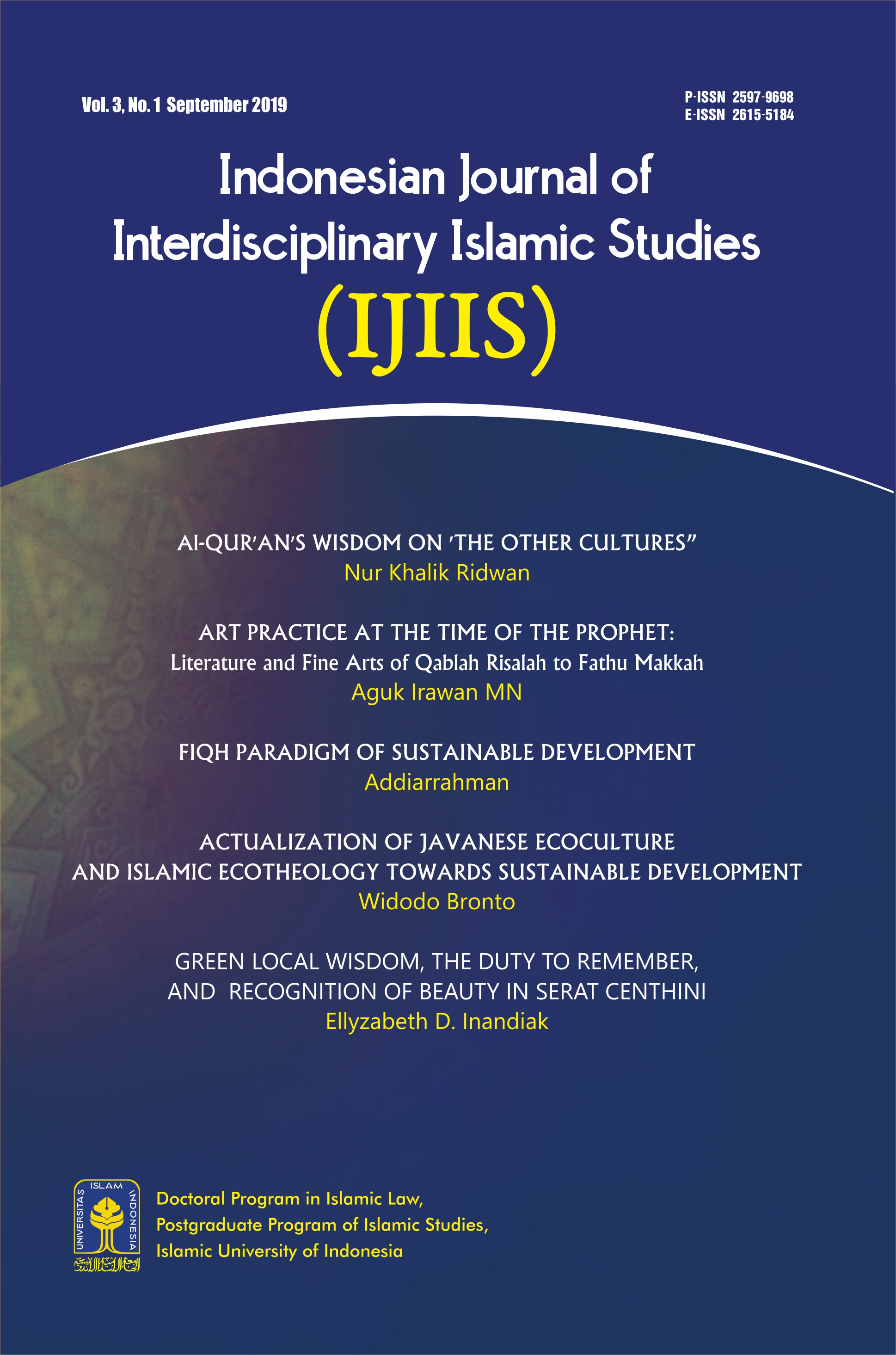Main Article Content
Abstract
Serat Centhini is often described as the encyclopedia of Java. The poem was indeed written at the beginning of the 19th century, but the “plot” takes place at the 17th century, a pivotal time in Central Java where Islam spreads and settles, while the older cults are still alive. Serat Centhini acts as a colossal cultural laboratory which tests the ancestral knowledge and traditions in the light of the new science of Islam. Will these knowledge and traditions become obsolete and disappear on their own? Will they persist because of their universal foundations, or because of their deep roots in local
wisdom, or their capacity to adjust and embrace a new form? Will they enter into conflict or go underground? The experimentation works two ways: will the new science of Islam be flexible enough to accommodate the ancestral world view in its modernity? This paper seeks to present three brilliant cultural strategies successfully put to test in the Centhini laboratory, in their ability to transcend time, and embrace social and religious transformations: green local wisdom, the duty to remember, and recognition of Beauty.
Keywords
Article Details

This work is licensed under a Creative Commons Attribution-ShareAlike 4.0 International License.
References
- Behrend T.E., “Technical Prolegomena to Any Future Centhini Critique” (Leiden, ESF Workshop: Encompassing Knowledge: Indigenous Encyclopedias in Indonesia in the 17th-20th Centuries, Leiden University, 1997).
- Darusuprata, Centhini, Tambangraras-Amongrara, Jilid I-IV ( Jakarta, Balai Pustaka, Jakarta 1991 -1999).
- Denis Lombard, Le Carrefour javanais, Essai d’histoire globale (Paris, Editions de l’EHESS, 1990) Vol 3, pp.130-142.
- H.M. Rasjidi, Considérations critiques du Livre Tjentini (Paris, Ph.D Université Paris Sorbonne, 1956, republished under the title : Documents pour servir à l’histoire de l’islam à Java, Paris, Ecole Française d’Extrême-Orient, 1977).
- Junanah, MIS, Kata Serapan Bahasa Arab dalam Serat Centhini (Yogyakarta, Safiria Insania Press, 2010).
- Jurusan Sastra Nusantara, Fakultas Ilmu Budaya, Universitas Gadjah Mada Yogyakarta, Kumpulan Makalah Seminar: Mengunkap Kolaborasi Isi dan Peluncuran Saduran Serta Centhini Jilid V-XII (Yogyakarta, Universitas Gadjah Mada, 2008).
- Kamajaya, Serat Centhini Latin (Yogyakarta, Yayasan Centhini, 12 Vol., 1986 -1991).
- Ki Sumidi Adisasmita, Pustaka Centhini, Ikhtisar Seluruh Isinya (Yogyakarta, U.P. Indonesia, 1975).
- Marcel Bonneff, « Centhini, servante du javanisme », Archipel, No.56 (1998), pp.483-511.
- Marsono, Koordinator dan Penyunting Tim Penyadur, Centhini, Tambangraras-Amongrara, Jilid V-XII (Yogyakarta, Gadjah Mada University Press, 2005-2008).
- Pigeaud Th., De Serat Tjabolang en de Serat Tjentini (Bandoeng, Koninklijk Bataviaasch Genootschap van Kunsten en Wetenschappen, 1933).
- R. Tohar, Kupasan Inti Serat Tjentini, Ilmu Kesempurnaan Jawa (Jakarta, Bhratara, Jakarta, 1967).
- Soewito Santoso, The Centhini Story, the Javanese Journey of Life (with photos by Fendi Siregar and additional text by Kestity Pringgoharjono, Singapore, Marshall Cavendish, 2006).
- Sumahatmaka, Ringkasan Centini (Suluk Tambanglaras) (Jakarta, Balai Pusaka, 1981).
- Tardjan Hadidjaja dan Kamajaya, Serat Centhini dituturkan dalam Bahasa Indonesia, Jilid I-A dan I-B (Yogyakarta, , U.P. Indonesia, 1978-1979).
- Zoetmulder, Pantheism and Monism in Javanese Suluk Literature (Leiden, KITLV Press, 1995).
References
Behrend T.E., “Technical Prolegomena to Any Future Centhini Critique” (Leiden, ESF Workshop: Encompassing Knowledge: Indigenous Encyclopedias in Indonesia in the 17th-20th Centuries, Leiden University, 1997).
Darusuprata, Centhini, Tambangraras-Amongrara, Jilid I-IV ( Jakarta, Balai Pustaka, Jakarta 1991 -1999).
Denis Lombard, Le Carrefour javanais, Essai d’histoire globale (Paris, Editions de l’EHESS, 1990) Vol 3, pp.130-142.
H.M. Rasjidi, Considérations critiques du Livre Tjentini (Paris, Ph.D Université Paris Sorbonne, 1956, republished under the title : Documents pour servir à l’histoire de l’islam à Java, Paris, Ecole Française d’Extrême-Orient, 1977).
Junanah, MIS, Kata Serapan Bahasa Arab dalam Serat Centhini (Yogyakarta, Safiria Insania Press, 2010).
Jurusan Sastra Nusantara, Fakultas Ilmu Budaya, Universitas Gadjah Mada Yogyakarta, Kumpulan Makalah Seminar: Mengunkap Kolaborasi Isi dan Peluncuran Saduran Serta Centhini Jilid V-XII (Yogyakarta, Universitas Gadjah Mada, 2008).
Kamajaya, Serat Centhini Latin (Yogyakarta, Yayasan Centhini, 12 Vol., 1986 -1991).
Ki Sumidi Adisasmita, Pustaka Centhini, Ikhtisar Seluruh Isinya (Yogyakarta, U.P. Indonesia, 1975).
Marcel Bonneff, « Centhini, servante du javanisme », Archipel, No.56 (1998), pp.483-511.
Marsono, Koordinator dan Penyunting Tim Penyadur, Centhini, Tambangraras-Amongrara, Jilid V-XII (Yogyakarta, Gadjah Mada University Press, 2005-2008).
Pigeaud Th., De Serat Tjabolang en de Serat Tjentini (Bandoeng, Koninklijk Bataviaasch Genootschap van Kunsten en Wetenschappen, 1933).
R. Tohar, Kupasan Inti Serat Tjentini, Ilmu Kesempurnaan Jawa (Jakarta, Bhratara, Jakarta, 1967).
Soewito Santoso, The Centhini Story, the Javanese Journey of Life (with photos by Fendi Siregar and additional text by Kestity Pringgoharjono, Singapore, Marshall Cavendish, 2006).
Sumahatmaka, Ringkasan Centini (Suluk Tambanglaras) (Jakarta, Balai Pusaka, 1981).
Tardjan Hadidjaja dan Kamajaya, Serat Centhini dituturkan dalam Bahasa Indonesia, Jilid I-A dan I-B (Yogyakarta, , U.P. Indonesia, 1978-1979).
Zoetmulder, Pantheism and Monism in Javanese Suluk Literature (Leiden, KITLV Press, 1995).
